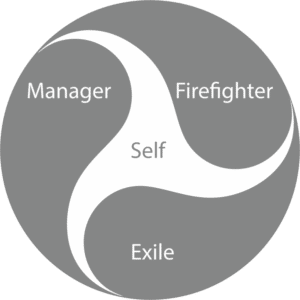
What Is Internal Family Systems Therapy?
The Internal Family Systems (IFS) model of psychotherapy offers an empowering method of understanding human problems, as well as an innovative and enriching philosophy of practice that invites both therapist and client to enter into a transformational relationship in which healing can occur. IFS is an evidenced, attachment, systems and mindfulness-based framework and approach to self-awareness, acceptance and long-lasting healing.
I would like to learn more information on internal Family Systems Therapy
Goals of IFS
To achieve balance and harmony within the internal system To differentiate and elevate the Self so it can be an effective leader in the system When the Self is in the lead, the parts will provide input to the Self but will respect the leadership and ultimate decision making of the Self. All parts will exist and lend talents that reflect their non-extreme intentions.

Parts
Subpersonalities are aspects of our personality that interact internally in sequences and styles that are similar to the ways in which people interact.
Parts may be experienced in any number of ways -- thoughts, feelings, sensations, images, and more.
All parts want something positive for the individual and will use a variety of strategies to gain influence within the internal system. Parts develop a complex system of interactions among themselves.
Polarizations develop as parts try to gain influence within the system.
While experiences affect parts, parts are not created by the experiences. They are always in existence, either as potential or actuality.
Parts that become extreme are carrying "burdens" -- energies that are not inherent in the function of the part and don't belong to the nature of the part, such as extreme beliefs, emotions, or fantasies. Parts can be helped to "unburden" and return to their natural balance.
Parts that have lost trust in the leadership of the Self will "blend" with or take over the Self.

Groups of Parts
EXILES
Young parts that have experienced trauma and often become isolated from the rest of the system in an effort to protect the individual from feeling the pain, terror, fear, and so on, of these parts
If exiled, can become increasingly extreme and desperate in an effort to be cared for and tell their story
Can leave the individual feeling fragile and vulnerable
MANAGERS
Parts that run the day-to-day life of the individual
Attempt to keep the individual in control of every situation and relationship in an effort to protect parts from feeling any hurt or rejection
Can do this in any number of ways or through a combination of parts -- striving, controlling, evaluating, caretaking, terrorizing, and so on.
FIREFIGHTERS
Group of parts that react when exiles are activated in an effort to control and extinguish their feelings
Can do this in any number of ways, including drug or alcohol use, self-mutilation (cutting), binge-eating, sex binges
Have the same goals as managers (to keep exiles away) but different strategies
SELF
Different level of entity than the parts -- often in the center of the "you" that the parts are talking to or that likes or dislikes, listens to, or shuts out various parts.
When differentiated, the Self is competent, secure, self-assured, relaxed, and able to listen and respond to feedback.
The Self can and should lead the internal system.
Various levels of experience of the Self:
When completely differentiated from all parts (Self alone), people describe a feeling of being "centered."
When the individual is "in Self" or when the Self is in the lead while interacting with others (day-to-day experience), the Self is experienced along with the non-extreme aspects of the parts.
An empowering aspect of the model is that everyone has a Self.
Benefits of IFS
Focuses on strengths: the undamaged core of the Self, the ability of parts to shift into positive roles.
IFS language provides a way to look at oneself and others differently.
Language encourages self-disclosure and taking responsibility for behavior.
IFS language is powerful.
Provides a way to work with "resistance" and denial
Ecological understanding of entire therapy system, including therapist.
Respect for individual's experience of the problem.
Clients provide the material -- the therapist doesn't have to have all the ideas.
Therapist looks at client's Self as "co-therapist" and trusts the wisdom of the internal system.
An Integrative Approach To Mental Health Care
At A Beautiful Soul Holistic Counseling, our clinicians are expertly trained in Advanced Mental Health Integrative Medicine approaches that help to address the whole person, which is essential in identifying the underlying issues, preventing optimal health and wellness.

